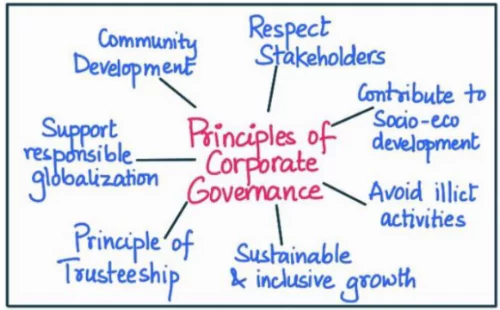Answer:
|
How to approach the question
- Introduction
- Write about international corporate governance briefly.
- Body
- Write the ethical imperatives for establishing robust international corporate governance systems.
- Write the practical challenges in establishing robust international corporate governance systems.
- Conclusion
- Give appropriate conclusion in this regard.
|
Introduction
International corporate governance is a crucial framework that promotes transparency, accountability, and integrity within multinational companies. The G20/OECD Principles of Corporate Governance released upholding these values to foster trust, resilience, long-term success in the global business arena and sustainable economic growth.
Body
Ethical imperatives for establishing robust international corporate governance systems
- Transparency and Disclosure: It ensures that stakeholders, including shareholders, employees, and the public, have access to accurate and timely information.
 Accountability and Responsibility: International corporate governance systems must hold executives and board members liable for their actions. E.g. Sarbanes-Oxley ACT (USA) holds corporate executives accountable for financial reporting.
Accountability and Responsibility: International corporate governance systems must hold executives and board members liable for their actions. E.g. Sarbanes-Oxley ACT (USA) holds corporate executives accountable for financial reporting.- Shareholder Rights Protection: Like the right to participate in decision-making, vote on important matters, and receive fair treatment. SEBI brought enhanced proxy voting and the requirement of shareholder approval for related-party transactions for it.
- Ethical Supply Chain Management: For ensuring that corporations uphold fair labour practices, environmental sustainability, and respect for human rights. Companies like Patagonia and
H&M have implemented strict ethical supply chain guidelines.
- Stakeholder Engagement: It fosters a more inclusive decision-making process and promotes sustainable business. Unilever’s Sustainable Living Plan actively involves stakeholders in shaping its sustainability goals exemplifies this.
- Promoting integrity: Robust corporate governance systems should include measures to prevent corruption, bribery, and unethical practices. The implementation of the Prevention of Corruption Act in India, helps ensure ethical business conduct.
- Corporate Social Responsibility (CSR): Companies should integrate social and environmental considerations into their business strategies. Like Wipro Cares program which focuses on education, healthcare, environmental sustainability.
Practical challenges in establishing robust international corporate governance systems
- Cultural Differences: Different countries have diverse cultural norms, which can affect implementation of corporate governance principles. Like, in India, family-owned businesses may prioritise loyalty to family members.
- Legal Frameworks: For example, the legal requirements for shareholder rights and board composition may differ between India’s Companies Act and the U.S. Securities and Exchange Commission regulations.
- Enforcement Mechanisms: Ensuring compliance globally is challenging due to inadequate enforcement mechanisms in some countries. Global Volkswagen emissions scandal, where lax governance allowed fraudulent practices to persist.
- Cross-Border Governance: Companies operating globally must navigate different governance frameworks, regulations, and reporting standards across jurisdictions. Like Facebook, which faces scrutiny and regulatory challenges in multiple countries.
- Shareholder Activism: Engaging shareholders in corporate governance decisions can be challenging, particularly in countries where shareholder activism is less prevalent.
- Monitoring and Accountability: The global accounting firm Arthur Andersen’s failure to detect and address accounting irregularities in Enron is a prominent example of monitoring and accountability challenges.
Conclusion
Thus, for establishing robust international corporate governance systems, it is essential to promote ethical leadership, strengthen legal frameworks, enhance transparency and accountability, foster international cooperation, and encourage responsible business practices across borders.
To get PDF version, Please click on "Print PDF" button.
 Accountability and Responsibility: International corporate governance systems must hold executives and board members liable for their actions. E.g. Sarbanes-Oxley ACT (USA) holds corporate executives accountable for financial reporting.
Accountability and Responsibility: International corporate governance systems must hold executives and board members liable for their actions. E.g. Sarbanes-Oxley ACT (USA) holds corporate executives accountable for financial reporting.
https://uploads.disquscdn.com/images/28f9db1d21ad3212527034cf531506b85961ff5f54132386e11227ebcf98fcd6.jpg https://uploads.disquscdn.com/images/40e7338d3c24d88550c05dd2b44123f903b67cac13bba18a512b3e0fa21a6b98.jpg